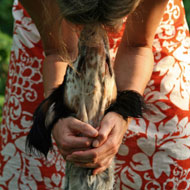Study reveals what makes dogs so friendly

By analysing behavioural and genetic data from dogs and wolves, the team confirmed a strong genetic aspect to human-directed social behaviour.
US scientists have identified genetic changes that are linked to how dogs behave towards humans.
The study, published in Sciences Advances, suggests there is a common underlying genetic basis for hypersocial behaviour in dogs and humans.
The research was conducted by an interdisciplinary team of researchers, funded by Princeton University's department of ecology and evolutionary biology.
In the study, the team sequenced a region of chromosome six in dogs and found multiple sections of DNA that were linked to differences in social behaviour.
In the majority of cases, unique genetic insertions called transposons on the William-Beuron Syndrome Critical Region (WBSCR) were strongly connected to a tendency to seek out humans for physical contact and information.
In humans, is the deletion of these genes that causes Williams-Beuron syndrome - a rare disorder characterised by hyper-social traits.
“It was the remarkable similarity between the behavioural presentation of Williams-Beuron syndrome and the friendliness of domesticated dogs that suggested to us that there may be similarities in the genetic architecture of the two phenotypes,” said the study’s lead co-author, Bridgett vonHoldt.
The first suggestion of a link between Williams-Beuron syndrome and dogs came in 2010 when vonHoldt and her team identified the canine analogue of the WBSCR.
Building on this work, the team collected and analysed behavioural data for 18 domesticated dogs and 10 captive human-socialised wolves, in addition to the biological samples used to sequence their genomes.
In line with their hypothesis, they confirmed that the domesticated dogs displayed more human-directed behaviour and spent more time in proximity to humans than the wolves. They also found that some of these transposons on the WBSCR were only found in domestic dogs, and not in wolves at all.
“We haven't found a social gene, but rather an important [genetic] component that shapes animal personality and assisted the process of domestication a wild wolf into a tame dog,” said vonHoldt.
Anna Kukekova, assistant professor in the department of animal sciences at the University of Illinois, who is familiar with the research but had no role in it, added: “The research provides evidence that there exist certain evolutionary conservative mechanism that contributes to sociability across species.
“That they have found this region contributes to sociability in dogs is exciting.”



 RCVS Knowledge has welcomed Professor Peter Cockcroft as editor-in-chief for Veterinary Evidence.
RCVS Knowledge has welcomed Professor Peter Cockcroft as editor-in-chief for Veterinary Evidence.